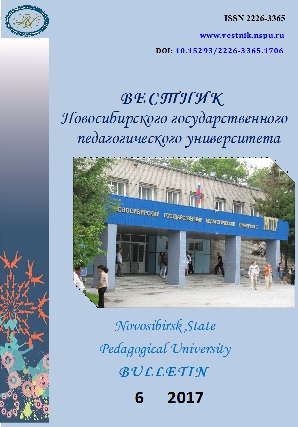Обыденная метаязыковая рефлексия немцев Сибири: на материале полевых экспедиций в Новосибирской области
Ordinary metalinguistic reflection of the Germans in Siberia: based on field expeditions in the Novosibirsk Region
Author(s): Zoya Matinovna Bogoslovskaya, Maria Alexeevna Shuvalova, Oleg Anatolyevich AlexandrovSubject(s): Regional Geography, Comparative Linguistics
Published by: Новосибирский государственный педагогический университет
Summary/Abstract: Introduction. The study is devoted to the problem of studying endangered cultures and languages by referring to the facts of explication of “folk” metalinguistic reflection. The aim of the work is to generalize knowledge about the language of speakers of endangered archaic forms of German language, who are living in Siberia. Materials and Methods. The work analyzes lexical means, which are, on the one hand, central elements of the structure of metalinguistic utterance, and, on the other hand, they are considered as representatives of dominant meanings of the system of everyday knowledge about the language. For the purpose of data-gathering, a dialectological survey has been conducted for the first time in the districts with the highest proportion of Germans (the Novosibirsk region of the Russian Federation). During the field work, a semi-structured narrative interview was used. It allowed to build up a corpus of metalinguistic utterances using German dialects. Data processing was carried out using statistical calculation, context analysis and cognitive modeling techniques. Results. It was revealed that at the present time the secondary German dialects, considered by their speakers as native forms of the language and interpreted in comparison with the modern German literary language and other linguistic formations, are preserved within the Novosibirsk region. Metalinguistic reflection is carried out according to the following models: language as a means of communication of a certain group of people and language as a system of words and language as a system of sounds. Each model assumes that the central object of reflection is a particular aspect of a language and the verbalization of this reflection is carried out in German dialect speech with usage of a certain set of lexical means. Conclusions. The conducted qualitative analysis of metalinguistic discourse in combination with quantitative analysis allows to draw a conclusion that the everyday knowledge of German dialect speakers reflects a significant range of linguistic phenomena, but it is meaningfully different from systematic scientific knowledge. The utilitarian understanding of language (language as a communication tool) is prevailing. The most frequently mentioned unit of language is a word. The material side of the language with its pronouncing features is also an object of comprehension. The phenomena of morphological and syntactic levels of linguistic system are interpreted indirectly by Germans of Siberia.
Journal: Вестник Новосибирского государственного педагогического университета
- Issue Year: 7/2017
- Issue No: 6
- Page Range: 250-262
- Page Count: 13
- Language: Russian

